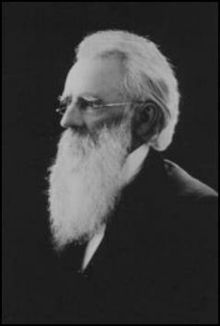Mason Brayman
Mason Brayman (born May 23, 1813 in Buffalo , New York , † February 27, 1895 in Kansas City , Missouri ) was an American politician and governor of the Idaho Territory from 1876 to 1878 . During the Civil War , he was a major general in the Union Army.
Early years
Mason Brayman grew up on a farm and took an early interest in the printing trade, in which he also worked for some time. Between 1834 and 1835 he published the newspaper "Buffalo Bulletin". After studying law, he was admitted to the bar in 1836. In the same year he moved to Monroe , Michigan . In 1838 he became a lawyer for this community. After moving to Springfield , he became a lawyer there from 1842. He also got to know his colleague Abraham Lincoln .
Political rise
Mason Brayman was initially a member of the Democrats , later he switched to the newly formed Republican Party . In 1843 he was a commissioner for the Illinois government. His job was to drive the Mormons out of the city of Nauvoo . Between 1844 and 1845 he served on a committee to review the Illinois laws. Since 1851 he worked as a lawyer for the Illinois Central Railroad .
When the Civil War broke out, Brayman became an army officer in the Union Army. At the end of the war, he held the rank of major general. Brayman held command posts primarily in Tennessee , Ohio, and Mississippi . During the last months of the war he was the head of the occupation forces in Natchez . On August 24, 1865, Brayman retired from the military. Between 1872 and 1873 he published the Illinois State Journal.
Territorial Governor of Idaho
On July 24, 1876, Brayman was named the new Territorial Governor of Idaho by President Ulysses S. Grant . He held this office until 1878. In 1877 the governor met 14 representatives of the Shoshone for peace talks. Even so, there was fighting. Brayman was very unpopular with the people of his territory. They disagreed with his leadership style and wrote several petitions to Washington asking for the governor to be removed. After an investigation by John Philo Hoyt , Brayman was exonerated.
After the end of his governorship, Brayman withdrew from politics. He died in Kansas City in 1895.
Web links
- Mason Brayman in the database of Find a Grave (English)
| personal data | |
|---|---|
| SURNAME | Brayman, Mason |
| BRIEF DESCRIPTION | American politician |
| DATE OF BIRTH | May 23, 1813 |
| PLACE OF BIRTH | Buffalo , New York |
| DATE OF DEATH | February 27, 1895 |
| Place of death | Kansas City , Missouri |

